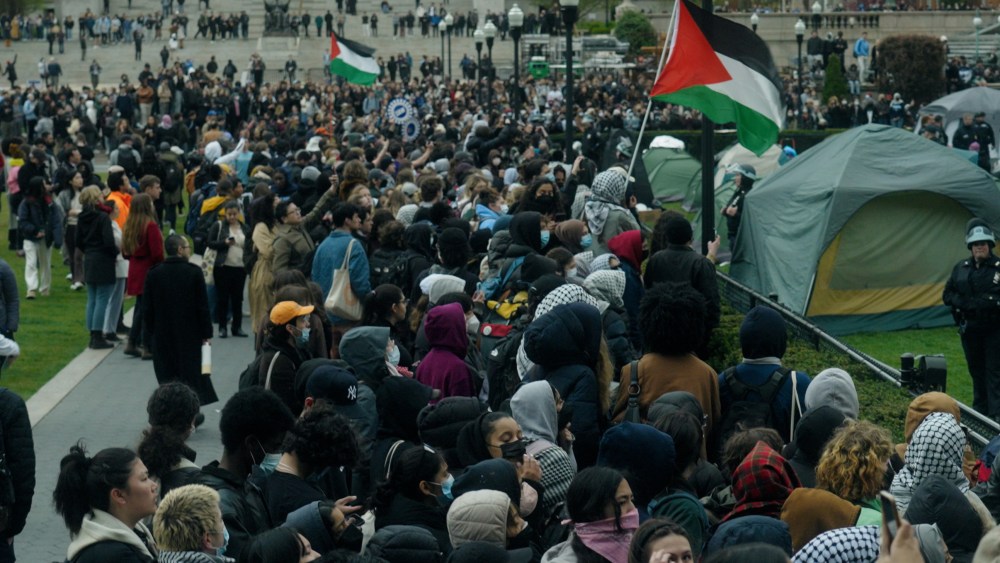Watermelon Pictures was created with a mission to change the mainstream narrative around Palestinian people and other marginalized communities. The film finance and distribution company came to fruition just in time to bear witness to the suffering caused by the conflict in Gaza.
Founded in April 2024 by brothers Badie Ali and Hamza Ali, the Chicago-based Watermelon Pictures has gained worldwide attention in its short time in business with such releases as “From Ground Zero” and its latest efforts, “The Encampments” and “The Teacher.”
The brothers hail from a family that has roots in film and media. Watermelon Pictures is a unit of Chicago-based MPI Media Group, which was founded by their father and uncle in 1976. At present, Watermelon has about 20 employees.
“We’re really just following their legacy — we’re not new to the industry and know how to navigate it,” Hamza Ali explains. “It’s something that I know my late uncle would be proud of.”
“The Encampments” is a documentary about the pro-Palestinian encampment that formed on the campus of Columbia University as conditions in Gaza deteriorated. “The Teacher,” starring Saleh Bakri and Imogen Poots, is a narrative drama revolving around a Palestinian schoolteacher struggling to support his students who becomes romantically involved with a British aid worker. Watermelon gave “The Teacher,” which premiered at the 2023 Toronto International Film Festival, a limited theatrical release in April after nabbing distribution rights in January.
The anthology film “From Ground Zero” compiles stories from 22 Palestinian directors. That 2024 release made the Academy Awards shortlist for best international film. And most recently, “The Encampments” had an impressive opening weekend in late March with an exclusive engagement at New York’s Angelika Film Center, grossing just under $80,000 and breaking the per-theater-average record previously set by National Geographic’s “Free Solo.”
In fact, the documentary was originally slated to release in the fall. But the team at Watermelon decided to move up the date with the current state of the world.
“With everything that’s been happening at Columbia, the Trump administration and the ICE abductions, we felt we really needed to provide this counter-narrative to what’s been spun,” Hamza Ali says.
The brothers’ focus has been giving Watermelon films proper theatrical runs and forming beneficial relationships with notable figures such as Michael Moore and Macklemore, who have served as executive producers on Watermelon releases. Badie Ali describes this effort as organic “community building.” And social media has been a crucial tool in mobilizing audiences, says Alana Hadid, the company’s creative director and unofficial brand ambassador.
“We have really focused on our grassroots to spread the message and they’ve turned out,” Hadid says. “We haven’t had to do much as far as paid advertising and that, again, speaks to how important these films are. People need them and people want them.”
Hadid describes how when Badie and Hamza Ali joined forces on Watermelon, they “definitely didn’t go in thinking it was going to be making money.” And while Hadid hasn’t been surprised by the interest and producers reaching out wanting to specifically work with Watermelon, she recognizes that they are making a “mark in what is considered a niche market.”
“It’s not necessarily that we’ve had pushback — we just haven’t seen these films platformed before,” Hadid says.
Watermelon aims to expand its reach with the launch of the subscription-based Watermelon+ streaming platform in May, which will create a dedicated cultural archive with Palestinian films from the past three decades. “It ensures that if these films don’t get another outlet, there will still be a place for them,” Hamza Ali says.
With the upcoming release of “To A Land Unknown,” Watermelon’s executive VP Justin DiPietro, who brings a wealth of distribution knowledge from his time at IFC and Netflix, recognizes that convincing arthouse theater exhibitors to play their narrative dramas requires a different approach.
“What I’ve been saying internally is that ‘The Teacher’ is not even necessarily a Palestinian film,” DiPietro says. “Yes, it has that component with the director and the story, but I’ve been pitching it as a straight political thriller that a highbrow audience will love.”
At the same time, the brothers recognize that Watermelon needs to tell stories that cross genres and reflect marginalized groups outside of Palestine. They cite shows like Hulu’s “Army” and Netflix’s “Mo” as “strong proof of concepts” for the growing appetite for content from this region.
“When we start telling our comedies, our dramas and some of these other more commercial stories, we really want to humanize our region that’s been neglected. That’s where we’ll have more impact,” Badie Ali says. “We came to the realization that we are the only Arab-led North American distribution company. We should use our platform to do this for ourselves — we can’t wait for somebody else.”
Read the full article here


